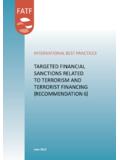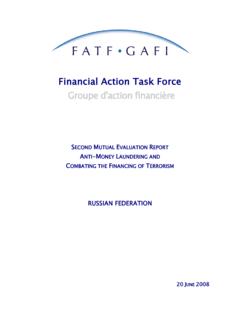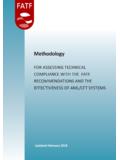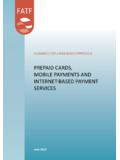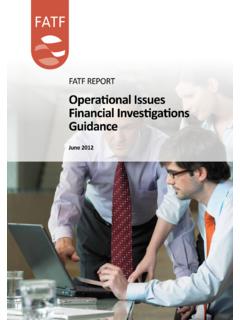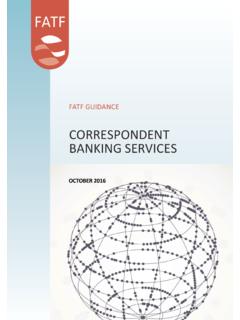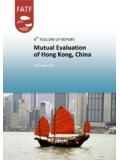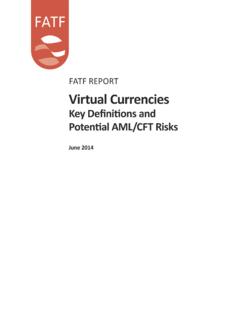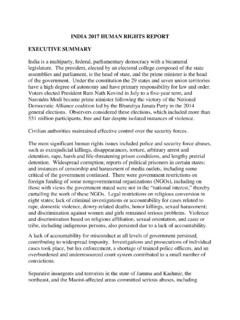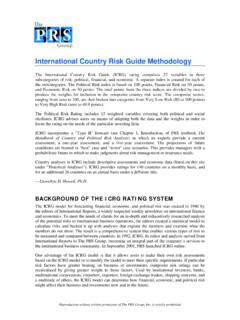Transcription of FATF IX Special Recommendations - FATF-GAFI.ORG
1 Financial Action Task Force Groupe d'action financi re fatf Standards fatf IX Special Recommendations October 2001. (incorporating all subsequent amendments until February 2008). The fatf revised the 40 and the IX Recommendations . The revision of the fatf Recommendation was adopted and published in February 2012. See for the 2012 fatf Recommendations . 2010 fatf /OECD - 1. fatf IX Special Recommendations fatf Special Recommendations on Terrorist Financing Recognising the vital importance of taking action to combat the financing of terrorism, the fatf has agreed these Recommendations , which, when combined with the fatf Forty Recommendations on money laundering, set out the basic framework to detect, prevent and suppress the financing of terrorism and terrorist acts. I. Ratification and implementation of UN instruments Each country should take immediate steps to ratify and to implement fully the 1999 United Nations International Convention for the Suppression of the Financing of Terrorism.
2 Countries should also immediately implement the United Nations resolutions relating to the prevention and suppression of the financing of terrorist acts, particularly United Nations Security Council Resolution 1373. II. Criminalising the financing of terrorism and associated money laundering Each country should criminalise the financing of terrorism, terrorist acts and terrorist organisations. Countries should ensure that such offences are designated as money laundering predicate offences. III. Freezing and confiscating terrorist assets Each country should implement measures to freeze without delay funds or other assets of terrorists, those who finance terrorism and terrorist organisations in accordance with the United Nations resolutions relating to the prevention and suppression of the financing of terrorist acts.
3 Each country should also adopt and implement measures, including legislative ones, which would enable the competent authorities to seize and confiscate property that is the proceeds of, or used in, or intended or allocated for use in, the financing of terrorism, terrorist acts or terrorist organisations. IV. Reporting suspicious transactions related to terrorism If financial institutions, or other businesses or entities subject to anti-money laundering obligations, suspect or have reasonable grounds to suspect that funds are linked or related to, or are to be used for terrorism, terrorist acts or by terrorist organisations, they should be required to report promptly their suspicions to the competent authorities. V. International Co-operation Each country should afford another country , on the basis of a treaty, arrangement or other mechanism for mutual legal assistance or information exchange, the greatest possible measure of assistance in connection with criminal, civil enforcement, and administrative investigations, inquiries and proceedings relating to the financing of terrorism, terrorist acts and terrorist organisations.
4 Countries should also take all possible measures to ensure that they do not provide safe havens for individuals charged with the financing of terrorism, terrorist acts or terrorist organisations, and should have procedures in place to extradite, where possible, such individuals. 2 - 2010 fatf /OECD. fatf IX Special Recommendations VI. Alternative Remittance Each country should take measures to ensure that persons or legal entities, including agents, that provide a service for the transmission of money or value, including transmission through an informal money or value transfer system or network, should be licensed or registered and subject to all the fatf Recommendations that apply to banks and non-bank financial institutions. Each country should ensure that persons or legal entities that carry out this service illegally are subject to administrative, civil or criminal sanctions.
5 VII. Wire transfers Countries should take measures to require financial institutions, including money remitters, to include accurate and meaningful originator information (name, address and account number) on funds transfers and related messages that are sent, and the information should remain with the transfer or related message through the payment chain. Countries should take measures to ensure that financial institutions, including money remitters, conduct enhanced scrutiny of and monitor for suspicious activity funds transfers which do not contain complete originator information (name, address and account number). VIII. Non-profit organisations Countries should review the adequacy of laws and regulations that relate to entities that can be abused for the financing of terrorism. Non-profit organisations are particularly vulnerable, and countries should ensure that they cannot be misused: (i) by terrorist organisations posing as legitimate entities.
6 (ii) to exploit legitimate entities as conduits for terrorist financing, including for the purpose of escaping asset freezing measures; and (iii) to conceal or obscure the clandestine diversion of funds intended for legitimate purposes to terrorist organisations. IX. Cash Couriers Countries should have measures in place to detect the physical cross-border transportation of currency and bearer negotiable instruments, including a declaration system or other disclosure obligation. Countries should ensure that their competent authorities have the legal authority to stop or restrain currency or bearer negotiable instruments that are suspected to be related to terrorist financing or money laundering, or that are falsely declared or disclosed. Countries should ensure that effective, proportionate and dissuasive sanctions are available to deal with persons who make false declaration(s) or disclosure(s).
7 In cases where the currency or bearer negotiable instruments are related to terrorist financing or money laundering, countries should also adopt measures, including legislative ones consistent with Recommendation 3 and Special Recommendation III, which would enable the confiscation of such currency or instruments. 2010 fatf /OECD - 3. fatf IX Special Recommendations Interpretative Notes Interpretative Note to Special Recommendation II: Criminalising the financing of terrorism and associated money laundering Objective 1. Special Recommendation II (SR II) was developed with the objective of ensuring that countries have the legal capacity to prosecute and apply criminal sanctions to persons that finance terrorism. Given the close connection between international terrorism and inter alia money laundering, another objective of SR II is to emphasise this link by obligating countries to include terrorist financing offences as predicate offences for money laundering.
8 The basis for criminalising terrorist financing should be the United Nations International Convention for the Suppression of the Financing of Terrorism, Definitions 2. For the purposes of SR II and this Interpretative Note, the following definitions apply: a) The term funds refers to assets of every kind, whether tangible or intangible, movable or immovable, however acquired, and legal documents or instruments in any form, including electronic or digital, evidencing title to, or interest in, such assets, including, but not limited to, bank credits, travellers cheques, bank cheques, money orders, shares, securities, bonds, drafts, letters of credit. b) The term terrorist refers to any natural person who: (i) commits, or attempts to commit, terrorist acts by any means, directly or indirectly, unlawfully and wilfully; (ii) participates as an accomplice in terrorist acts; (iii) organises or directs others to commit terrorist acts; or (iv).
9 Contributes to the commission of terrorist acts by a group of persons acting with a common purpose where the contribution is made intentionally and with the aim of furthering the terrorist act or with the knowledge of the intention of the group to commit a terrorist act. 1. Although the UN Convention had not yet come into force at the time that SR II was originally issued in October 2001 and thus is not cited in the SR itself the intent of the fatf has been from the issuance of SR. II to reiterate and reinforce the criminalisation standard as set forth in the Convention (in particular, Article 2). The Convention came into force in April 2003. 4 - 2010 fatf /OECD. fatf IX Special Recommendations c) The term terrorist act includes: i) An act which constitutes an offence within the scope of, and as defined in one of the following treaties.
10 Convention for the Suppression of Unlawful Seizure of Aircraft (1970), Convention for the Suppression of Unlawful Acts against the Safety of Civil Aviation (1971), Convention on the Prevention and Punishment of Crimes against Internationally Protected Persons, including Diplomatic Agents (1973), International Convention against the Taking of Hostages (1979), Convention on the Physical Protection of Nuclear Material (1980), Protocol for the Suppression of Unlawful Acts of Violence at Airports Serving International Civil Aviation, supplementary to the Convention for the Suppression of Unlawful Acts against the Safety of Civil Aviation (1988), Convention for the Suppression of Unlawful Acts against the Safety of Maritime Navigation (1988), Protocol for the Suppression of Unlawful Acts against the Safety of Fixed Platforms located on the Continental Shelf (1988), and the International Convention for the Suppression of Terrorist Bombings (1997); and ii) Any other act intended to cause death or serious bodily injury to a civilian, or to any other person not taking an active part in the hostilities in a situation of armed conflict, when the purpose of such act, by its nature or context, is to intimidate a population, or to compel a Government or an international organisation to do or to abstain from doing any act.
